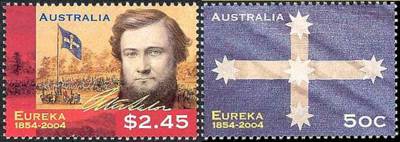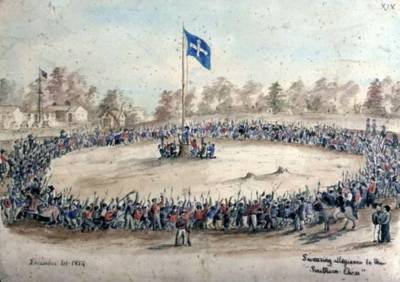
Image source: WADP Numbering System [2 images stitched together.] Click image to enlarge.
The $2.45 stamp uses an image of Peter Lalor, the man who led the diggers at the stockade. The 50c stamp features a representation of the Eureka flag, which at the time was called the flag of the Southern Cross.
Gold miners swearing allegience to the 'Southern Cross' on 30 November, 1854. Painting by Charles Doudiet, a participant in the rebellion. [Ballarat Fine Art Gallery]

Some five hundred armed diggers advanced in real sober earnestness, the captains of each division making the military salute to Lalor, who now knelt down, the head uncovered, and with the right hand pointing to the standard exclaimed in a firm, measured tone: -[quote from Raffaello Carboni's book, The Eureka Stockade. (see link at Project Gutenberg below)]
"WE SWEAR BY THE SOUTHERN CROSS TO STAND TRULY BY EACH OTHER, AND FIGHT TO DEFEND OUR RIGHTS AND LIBERTIES."
An universal well rounded AMEN was the determined reply; some five hundred right hands stretched towards our flag."
Here is a link to the Archives of the Eureka Stockade.
The State Library of Victoria has pages devoted to the Australian gold fields in general and to the Eureka Stockade in particular.
Project Gutenberg has a couple of books about the Australian gold fields:
- Read The Eureka Stockade by Raffaello Carboni for an account of the rebellion. Here are some excerpts from the beginning of the book:
I undertake to do what an honest man should do, let it thunder or rain. He who buys this book to lull himself to sleep had better spend his money in grog. He who reads this book to smoke a pipe over it, let him provide himself with Plenty of tobacco--he will have to blow hard. A lover of truth--that's the man I want--and he will have in this book the truth, and nothing but the truth.
[snip]
. . . I was an actor, and therefore an eye-witness. The events I relate, I did see them pass before me. The persons I speak of, I know them face to face. The words I quote, I did hear them with my own ears. Others may know more or less than I; I mean to tell all that I know, and nothing more.
Two reasons counsel me to undertake the task of publishing this work; but a third reason is at the bottom of it, as the potent lever; and they are--
1st. An honourable ambition urging me to have my name remembered among the illustrious of Rome. I have, on reaching the fortieth year of my age, to publish a work at which I have been plodding the past eighteen years. An ocean of grief would overwhelm me if then I had to vindicate my character: how, under the hospitality of the British flag, I was put in the felon's dock of a British Supreme Court to be tried for high treason.
2nd. I have the moral courage to show the truth of my text above, because I believe in the resurrection of life.
3rd. Brave comrades in arms who fell on that disgraced Sabbath morning, December 3rd, worthy of a better fate, and most certainly of a longer remembrance, it is in my power to drag your names from an ignoble oblivion, and vindicate the unrewarded bravery of one of yourselves! He was once my mate, the bearer of our standard, the "Southern Cross." Shot down by a murderous hand, he fell and died struggling like a man in the cause of the diggers. But he was soon forgotten. That he was buried is known by the tears of a few true friends! the place of his burial is little known, and less cared for. - A Lady's Visit To The Gold Diggings Of Australia In 1852-53 by Ellen Clacy which tells about earlier days in the gold fields--before the rebellion:
. . . For the sake of order the Governor attempted to put a stop to the increasing desertion of the capital by proclaiming that the gold-fields were the prerogative of the Crown, and threatening gold-diggers with prosecution. It was all in vain. The glitterings of the precious metal were more attractive than the threats of the Governor were otherwise. The people laughed good-humoured at the proclamation, and only flocked in greater numbers to the auriferous spot.
[emphasis added. The license-fee was one of the gold miners' primary grievances.]
Government now took a wiser course, and finding it impossible to stem the torrent, determined to turn the eagerness of the multitude to some account. A licence-fee of 30s., or half an ounce of gold, per month was imposed, which, with few exceptions, has always been cheerfully paid.
It may be well here, at once, to correct a false impression entertained and insisted upon by some, that the license Fee is a tax, and as such moreover, unjust... The term is in in no way applicable... It is a charge made upon the individual for the liberty of seeking and appropriating to his own use that which, according to Law, is the property of the public, Property from which it is but reasonable and just, that the community at large... should reap some advantage for the common good...After June 1854, La Trobe's successor as governor, Sir Charles Hotham, insisted on rigorous enforcement of the license fee. In October 1854, when a miner was murdered and a court [made up of mining officials, apparently] discharged the arrested suspects, miners protested the unjust verdict; some form a mob that burned the hotel owned by one of the suspects. Unrest continued. Late in November, miners burned the licenses at a mass meeting.
The next day, 30 November 1854, Commissioner Robert Rede demanded to see miners' licenses:
There was a large mob assembled just at the corner by the Express store. I addressed them, and begged them not to go against the law - that nothing would grieve me more than to have recourse to violence; but as long as the license fee was the law it was my duty to maintain it, and I would do so. I then begged of them to go back to their tents and to their work... There were a great many stones thrown at me, and a good deal of abusive language. I called on them three times to disperse; they would not disperse, and I read the Riot Act. I had that with me, written on a large sheet of paper so that all the world should see, if they could not hear... When I had read the Riot Act the greater number... went away; a good many did not... There was one man most abusive and uproarious, and I went up to him myself and said, 'Have you got your license?' He said, 'No'. 'Then,' I said, 'I will arrest you'... A large number of people came around me and rescued him; there were so many I could not hold him.[--Robert Rede, Minutes of Evidence, Report of the Commission Appointed to Enquire into the Condition of the Gold Fields, p. 309. Victoria. Legislative Council. Votes and Proceedings 1854-5, v.2. ]
This was the day that the miners gathered to swear their allegiance to the 'Southern Cross' and began to build and provision the Eureka Stockade. On Sunday, December 3, 1854, police with calvary and infantry troops attacked the stockade, killing about 30 and arresting over a hundred. Many miners had left the stockade to get supplies, thinking that the government wouldn't attack on Sunday! Later trials acquitted 13 of the suspected 'rioters.' The editor of the Ballarat times, Henry Seekamp, was convicted of seditious libel and was imprisoned for six months. The State Library of Victoria's time-line concludes in March 1855:
Report of Gold Fields Commission recommends replacement of licence fee with an export duty on gold, issuing of a £1 annual 'miner's right' constituting the miner's title deed to his claim, and the opening of Crown land to small holders. Recommendations promptly adopted by government.Hotham resigns as Governor.
Father, let me dedicate All this year to you
In whatever earthly state You will have me be
Not from sorrow, pain, or care Freedom dare I claim;
This alone shall be my prayer: Glorify Your name.
--from New Year's Hymn by Lawrence Tuttiett, 1864 (alt.)
In whatever earthly state You will have me be
Not from sorrow, pain, or care Freedom dare I claim;
This alone shall be my prayer: Glorify Your name.
--from New Year's Hymn by Lawrence Tuttiett, 1864 (alt.)

